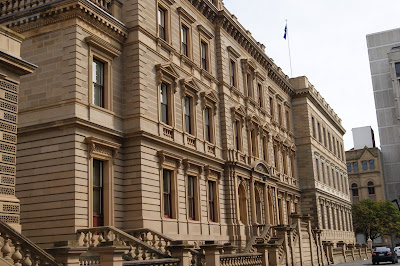Governor Lachlan Macquarie was Hobart’s first town planner and in 1811, he laid out a large area including what is now Franklin Square and named it George’s Square in honor of the King. He intended it to be the site of a church, a court house, a town hall, a public market, a main guard and public garrison parade area.
From 1817, regular musters were held there, segregated so that free men, free women, convict men & convict women were all assembled on different days to be counted. No one could forget that Hobart Town was a prison! The site was even the original location of the first substantial Government House, initially constructed in 1817.
With the end of transportation in 1853 everyone relaxed. The former parade and muster grounds became a public park. Colonists still homesick for the rich greens of England planted oaks in 1863, and later added elders, elms, limes and other European species. The variety is wonderful and the new park must have been very popular.
The 1850’s were boom years for Tasmania. There was plenty of money around from whale oil, the Victorian gold rush and wheat production. There was also great confidence in a glorious future for the newly independent colony. Grand public buildings are a traditional means of expressing such optimism so in 1860 a new Supreme Court building was built facing Macquarie Street on Franklin Square. At that time it was decided that criminal & civil sittings should be held in different buildings. Civil cases were held in Franklin Square whilst criminal cases were tried in the former chapel at the Campbell Street goal. The new building in Franklin Square also accommodated the Executive Council and rooms were provided for the Governor. It is still in use as a court.
The discovery of rich mineral resources in the 1880’s bought renewed confidence in a bright future and by 1884 extra buildings were being constructed next to the Supreme Court building to provide improved accommodations for the public offices. It now houses the offices of the Department of Premier and cabinet.
In 1923 it passed into the control of the Hobart City Council who embarked on major improvements including repairs to the pond and stocking it with goldfish, placing cane baskets around for rubbish bins, paving and gravelling of paths and new garden beds and lawn areas.
Much of the effect of this work was spoilt by the air raid trenches dug in 1942. The multiple jet fountain and colored lights were installed in 1964 and an ambitious remodeling program won a national award in 1986.
It is now a popular place for workers at lunch time and a forum venue for political rallies










